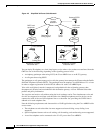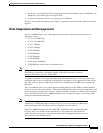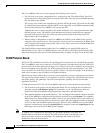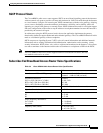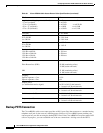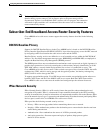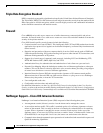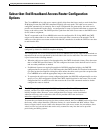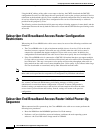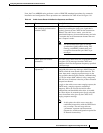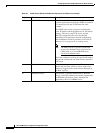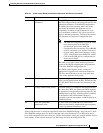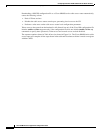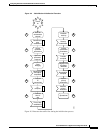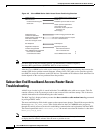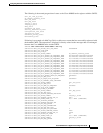
Configuring Subscriber-End Broadband Access Router Features
Subscriber-End Broadband Access Router Configuration Restrictions
MC-626
Cisco IOS Multiservice Applications Configuration Guide
Using the MAC address of the cable access router as the key, the CMTS downloads the DOCSIS
configuration file and Cisco IOS image that will provide the services that you have purchased. Service
technicians at the headend typically create a number of standard configuration files to match the range
of services offered by the provider; these configuration files can be created manually or with tools
provided for this purpose by Cisco.
The following sections describe the initial power-up and provisioning sequences in more detail, and the
requirements that must be met by both the cable access router and the CMTS before provisioning can be
successful.
Subscriber-End Broadband Access Router Configuration
Restrictions
When using the Cisco uBR900 series cable access router, be aware of the following restrictions and
limitations:
• The Cisco uBR900 series is able to implement multiple classes of service (CoS) on the cable
interface; however, separate CoS streams are only available when the cable access router is
connected to a headend that supports multiple CoS per cable access router. In addition, the
configuration file downloaded to the cable access router must specify the use of multiple CoS.
• If the Cisco uBR900 series is connected to a DOCSIS 1.0 headend that does not support multiple
CoS per cable access router, voice and data will be mixed, and voice traffic will be transmitted on a
best-effort basis. This may cause poorer voice quality and lower data throughput when calls are
being made from the cable access router telephone ports. Voice quality is also affected when large
files are downloaded or transmitted, and by other substantial network traffic.
Note The Cisco uBR900 series cable access router is typically configured by the headend CMTS.
Most cable service providers do not permit local configuration by individual subscribers.
Note Before attempting to reconfigure a Cisco uBR900 series cable access router at a subscriber
site, contact your network administrator, provisioning manager, or billing system
administrator to ensure that remote configuration is allowed. If remote configuration is
disabled, settings you make and save at the local site will not remain in effect after the cable
access router is powered down and back up. Instead, settings will return to the previous
configuration.
Subscriber-End Broadband Access Router Initial Power-Up
Sequence
When connected and first powered up, the Cisco uBR900 series cable access router performs the
following boot procedures:
• Boots the ROM from the ROMMON partition of its Flash memory.
• Performs a self-test, initializes processor hardware, and boots the main operating system
software—the Cisco IOS release image stored in NVRAM.



